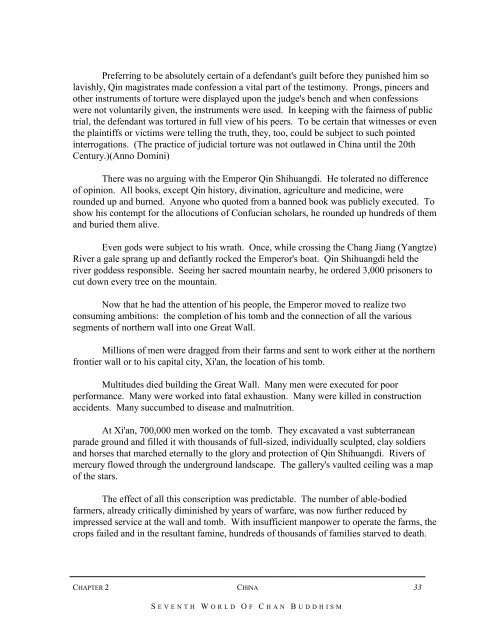seventh world of chan buddhism - Zen Buddhist Order of Hsu Yun
seventh world of chan buddhism - Zen Buddhist Order of Hsu Yun
seventh world of chan buddhism - Zen Buddhist Order of Hsu Yun
You also want an ePaper? Increase the reach of your titles
YUMPU automatically turns print PDFs into web optimized ePapers that Google loves.
Preferring to be absolutely certain <strong>of</strong> a defendant's guilt before they punished him so<br />
lavishly, Qin magistrates made confession a vital part <strong>of</strong> the testimony. Prongs, pincers and<br />
other instruments <strong>of</strong> torture were displayed upon the judge's bench and when confessions<br />
were not voluntarily given, the instruments were used. In keeping with the fairness <strong>of</strong> public<br />
trial, the defendant was tortured in full view <strong>of</strong> his peers. To be certain that witnesses or even<br />
the plaintiffs or victims were telling the truth, they, too, could be subject to such pointed<br />
interrogations. (The practice <strong>of</strong> judicial torture was not outlawed in China until the 20th<br />
Century.)(Anno Domini)<br />
There was no arguing with the Emperor Qin Shihuangdi. He tolerated no difference<br />
<strong>of</strong> opinion. All books, except Qin history, divination, agriculture and medicine, were<br />
rounded up and burned. Anyone who quoted from a banned book was publicly executed. To<br />
show his contempt for the allocutions <strong>of</strong> Confucian scholars, he rounded up hundreds <strong>of</strong> them<br />
and buried them alive.<br />
Even gods were subject to his wrath. Once, while crossing the Chang Jiang (Yangtze)<br />
River a gale sprang up and defiantly rocked the Emperor's boat. Qin Shihuangdi held the<br />
river goddess responsible. Seeing her sacred mountain nearby, he ordered 3,000 prisoners to<br />
cut down every tree on the mountain.<br />
Now that he had the attention <strong>of</strong> his people, the Emperor moved to realize two<br />
consuming ambitions: the completion <strong>of</strong> his tomb and the connection <strong>of</strong> all the various<br />
segments <strong>of</strong> northern wall into one Great Wall.<br />
Millions <strong>of</strong> men were dragged from their farms and sent to work either at the northern<br />
frontier wall or to his capital city, Xi'an, the location <strong>of</strong> his tomb.<br />
Multitudes died building the Great Wall. Many men were executed for poor<br />
performance. Many were worked into fatal exhaustion. Many were killed in construction<br />
accidents. Many succumbed to disease and malnutrition.<br />
At Xi'an, 700,000 men worked on the tomb. They excavated a vast subterranean<br />
parade ground and filled it with thousands <strong>of</strong> full-sized, individually sculpted, clay soldiers<br />
and horses that marched eternally to the glory and protection <strong>of</strong> Qin Shihuangdi. Rivers <strong>of</strong><br />
mercury flowed through the underground landscape. The gallery's vaulted ceiling was a map<br />
<strong>of</strong> the stars.<br />
The effect <strong>of</strong> all this conscription was predictable. The number <strong>of</strong> able-bodied<br />
farmers, already critically diminished by years <strong>of</strong> warfare, was now further reduced by<br />
impressed service at the wall and tomb. With insufficient manpower to operate the farms, the<br />
crops failed and in the resultant famine, hundreds <strong>of</strong> thousands <strong>of</strong> families starved to death.<br />
CHAPTER 2 CHINA<br />
S EVENTH W ORLD O F C HAN B UDDHISM<br />
33


